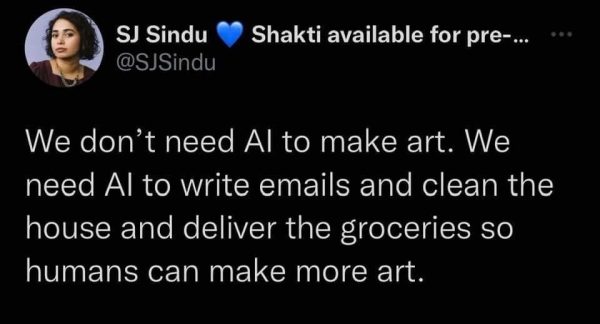
Need context? Check out this article from about 48 hours ago:

Need context? Check out this article from about 48 hours ago:
Pictured above is Haraldur Thorleifsson, better known as Halli. He founded Ueno, an agency that designed digital brands and experiences for a fine list of clients that included Airbnb, Apple, ESPN, Dropbox, Facebook, Google, NY Times, Oculus, PayPal, Uber, Venmo, Visa, and Walmart. As a result of their success, Ueno was acquired by Twitter in 2021. That’s the good news. The bad news is that Twitter was then acquired by Elon Musk in 2022.
Halli had a problem: he had no idea if he’s still a Twitter employee or not.
Here’s his situation, explained in a tweet made at 3:38 p.m. Eastern Standard Time (UTC-5) on Monday, March 6th:
About four hours later, Musk replied.
Halli made a very good point there. Musk replied with this:
That definitely doesn’t look legally binding, but what other path of communication did Halli have? He replied, carefully treading the line between providing enough information to explain the work he did and not breaking any non-disclosure agreements. What he did required a fair bit of effort; everything Musk did so far required little or none:
Here are Musk’s responses: an adolescent “pics or it didn’t happen” and the “What would you say you do here?” clip featuring “The Bobs” from Office Space (which, ironically enough, was about working for a terrible boss at a soul-crushing workplace):
At this point, Musk wasn’t trying to converse — he was simply trolling. Employees from Twitter acquisitions were laid off the previous week (as evidenced by this tweet by Leah Culver), but Halli hadn’t yet been informed.
Here’s what happened in the end, as explained in a couple of tweets from Halli that appeared a few minutes ago at the time of writing:
Halli was definitely the better person in the conversation, but when Elon Musk is the other person, the bar’s pretty low.
What Musk demonstrated in this exchange wasn’t leadership, nor was it management — in fact it wasn’t even decent. It was simply Musk being what he is at his rotten core: an asshole. I’m using philosophy professor Aaron James’ definition from his book, Assholes: A Theory: someone who “allows himself to enjoy special advantages in social relations out of an entrenched sense of entitlement that immunizes him against the complaints of other people.”
More irksome than Musk’s behavior is the number of responses by others cheering him on, questioning Halli’s value, or calling for Halli’s firing. I looked at a number of these fanboys’ profiles — and yes, they were largely male — and while many of them liked to portray themselves as independent thinkers and savvy businesspeople, most also appeared to collect a paycheck every two weeks, live vicariously through Musk’s public persona, and their Twitter feeds looked like laundry lists of grievances against “others.”
The cruelty from Musk’s supporters towards Halli reminds me of a couple of lines from a critique of the classic sci-fi short story, The Cold Equations:
…I think these readers are tripping on the story’s considerable jolt of machismo. It’s a commonplace that our civilization is soft and sentimental. It’s less remarked that soft and sentimental people — particularly the chair-bound geek variant — often idolize brutality. The actual inhabitants of barbarian eras don’t necessarily share this feeling; they often took pains to appear as refined and cultured people.
There were a few posters for whom this was the incident that caused them to question their admiration for Musk. It might be that this is the first time they could picture themselves in the position of the person having to face off against Musk, instead of seeing Musk as the movie protagonist you’re supposed to identify with.
Stop worshipping Elon Musk. He’s not Tony Stark; he’s Justin Hammer.
If you’re still using Twitter, give Halli a follow and drop him an encouraging line.
From the article in Iceland Review:
Haraldur Þorleifsson, known as Halli, has garnered multiple Person of the Year Awards from various Icelanidc media outlets, including from national broadcaster RÚV, Morgunblaðið, and Vísir.
Halli, a 45 year-old designer, gained nation-wide recognition this year when, after the sale of his tech company Ueno to Twitter, he chose to be paid the sale price as wages. Normally in such large sales, the payment comes in the form of stock or other financial instruments, which categorize the sale as capital gains, meaning it is taxed at a much lower rate. Halli, however, gladly paid the higher tax rate, having spoken publicly on many occasions about the benefits he has received from the Icelandic social system.
Halli was born with muscular dystrophy and came from a working class background. In statements about his decision to pay back into the Icelandic social system, he cited both healthcare and education in Iceland as keys to his success. Notably, he was one of the highest tax payers in the nation after the sale of Ueno.
Attention techies with a social media presence or looking to build one: THIS is what you post shortly after a very public, somewhat embarrassing setback. No bitterness, no recriminations, no finger-pointing — but clever self-deprecation.
In case you need context, the person behind the tweet is Esther Crawford, whom you might know from this tweet:
She’s one of the “Twitter 1.0” people who worked hard to get into Elon Musk’s good graces, which I wrote about in an earlier post, titled Lessons from the “sleeping bag director” at Twitter who just got laid off.
And in case you don’t know what the meme’s about, it’s made of stills from the TV series The Last of Us, and it features Joel, one of the protagonists, having panic attacks.
Another good trick: answer what looks like a bad-faith question in a straightforward way, as if it were a good-faith question. Thomas Maxwell responded to Esther’s tweet with a question about sleeping bags, as shown above.
It was probably a good-faith question, judging from Maxwell’s Twitter timeline, but put yourself in Esther Crawford’s shoes. She’s probably still processing her very public layoff and dealing with slings and arrows from critics. In her position — and even as an observer — Maxwell’s question could easily be seen as a bad-faith barb.
Crawford did the right thing: she answered it as if it were a legitimate, good-faith question. This has a double-advantage:
You may remember this tweet from a little less than four months ago:
The tweeter of that viral post and sleeper in the photo is Esther Crawford, Director of Product Management at Twitter — or at least she was. This weekend, she and at least 50 other employees were laid off.
She was recently the subject of an article in the Financial Times on January 24th (barely over a month ago) titled The rise of Esther Crawford in Elon Musk’s ‘hardcore’ Twitter. It tells the story of how she managed to become one of the few pre-Musk employees to parley their way into becoming one of “Space Karen’s” trusted lieutenants and in charge of several initiatives to make the company profitable, including Twitter Blue.
Her “sleeping bag” tweet raised a lot of eyebrows, including this short, yet spot-on response from Grady Booch, one of the patron saints of software development (and object-oriented programming in particular):
Crawford followed up with a multiple-tweet response:
[1] Since some people are losing their minds I’ll explain: doing hard things requires sacrifice (time, energy, etc). I have teammates around the world who are putting in the effort to bring something new to life so it’s important to me to show up for them & keep the team unblocked.
[2] I work with amazingly talented & ambitious people here at Twitter and this is not a normal moment in time. We are less than 1wk into a massive business & cultural transition. People are giving it their all across all functions: product, design, eng, legal, finance, marketing, etc
[3] We are #OneTeam and we use the hashtag #LoveWhereYouWork to show it, which is why I retweeted with #SleepWhereYouWork — a cheeky nod to fellow Tweeps. We’ve been in the midst of a crazy public acquisition for months but we keep going & I’m so proud of our strength & resilience.
[4] I love my family and I’m grateful they understand that there are times where I need to go into overdrive to grind and push in order to deliver. Building new things at Twitter’s scale is very hard to do. I’m lucky to be doing this work alongside some of the best people in tech. 💙
And it was great to see this follow-up from her supportive husband. I’m a firm believer that a marriage is a team, and kudos to Bob Cowherd for this tweet:
I have nothing but respect for Crawford’s drive, determination, and willingness to put in “crunch time.” I have nothing but praise for Cowherd’s supportiveness. Having worked for similarly careless, callous, and capricious bosses — they just didn’t come up from apartheid emerald money — I believe that Crawford’s intense dedication was wasted on Elon Musk.
My recommendation to any Twitter employee back in November was to leave, as I said in my November 7 post (5 days after Crawford’s “sleeping bag” tweet), Advice to laid-off Twitter employees being asked to come back. It even ends with the “sleeping bag” photo and this line:
If you can afford not to, don’t go back. You’re being asked to go back to Hell.
Some people on Twitter were more blunt — and in hindsight, prescient:

I’ve had more than a few conversations — often over drinks, so these are backed by in vino veritas — where someone says that loyalty to a company is a sucker’s game. I think the truth is a little more nuanced than that.
A certain degree of loyalty to an employer who has earned it is actually a good thing. You’re more likely to be happy at work, and that’s important, as you’re that’s how you’re going to spend half your waking life from Monday through Friday. With this kind of loyalty comes two-way trust, and as Steven Covey puts it: Without trust, we don’t truly collaborate; we merely coordinate or, at best, cooperate. It is trust that transforms a group of people into a team.
I like and trust the company I work for and the team I work on. In fact, looking at the teams I’ve worked with in the past decade, the current one is my favorite. I like my manager, my manager’s co-managers, my “skip-level” manager, and the various C-level people, most of whom I’ve had the chance to meet (and even play accordion for). They have my loyalty — within reason — because I know that I also have their reciprocal loyalty — also within reason.
It’s clear to me that the organization isn’t a family. It’s a publicly-owned corporation that operates in the present-day economy. My relationship with the company is pleasant, cordial, and thanks to its culture, convivial, but I know it’s also transactional. Implicit in the employment contract between me and the company is the understanding that the basis of our relationship is that I give them my time and effort and they give me money.
Even with co-workers, managers, and C-level execs who I feel conduct themselves with decency and honor, my loyalty — which is considerable; I have Auth0 stickers on my accordion — is given with reasonable limits.
I would not extend that same loyalty to less decent, less honorable people. And I would most certainly not extend that loyalty to a vaingloriously venal weasel like Elon Musk.

While I am not in possession of the magic glasses that lets me see people’s true intentions, I’ve seen shit. And from the moment that Musk walked into Twitter HQ with a sink for comedic effect, Crawford has been doing exactly what one should do to get into the good graces of a petty, vengeful narcissist (who views most people as NPCs) that just spent billions on a criticism factory.
Consider this bit from the Financial Times piece:
When Musk first came to the San Francisco headquarters just before the deal closed, Crawford introduced herself in the Perch, Twitter’s on-site coffee shop, and secured a one-on-one meeting to discuss her ideas around payments and creators, according to multiple people familiar with the encounter.
And that “sleeping bag” photo? In the well-lit conference room? That’s somehow pristine clean even though everyone was in crunch mode? That ain’t no candid shot.
Also consider that Crawford grew up in a cult. In that kind of environment, you probably learn a couple of tricks on how to handle leaders who think they are the spokespeople for a higher power, or worse still, think they are that higher power.
Lest you think that I’m engaging in hyperbole by calling Elon Musk a narcissist, remember that he was so incensed that his Super Bowl tweet got only 9 million impressions compared to Joe Biden’s nearly 29 million that a “high urgency” message to @here on Twitter’s Slack was made to “any people who can make dashboards and write software” at 2:36 a.m. on the morning after the game. And let’s not forget that at a meeting to discuss the “lack of engagement” with his tweets, an engineer was fired for suggesting that public interest in Elon’s tweets had peaked and was now dropping.
I have worked at places whose mission I believed in, but whose management I did not. I believe that Crawford’s was a similar situation. And I took a similar approach, all the while readying not just Plan B, but the additional Plans C through G.

Many people are going to dunk on Crawford for the next couple of days. Some of them will be from the Elon Musk fan club, who will say that she simply failed to deliver. Others will be Musk detractors, who will say that it’s what you get for working an egomaniacal autocrat.
Many of them will be the sort whose tendencies are to punish women for the sin of being ambitious. Keep that in mind.
Even if the purpose of this post was to dunk on Esther Crawford — and it isn’t — I would still be “punching up.”
Crawford came to Twitter by way of acquisition. Twitter bought the video chat startup she founded, Squad, in late 2020. While the amount wasn’t disclosed, a look at Twitter acquisitions shows that they haven’t bought any company for less than double-digit millions. She has a great resume, she can always point to that profile in Financial Times, and she’ll likely be featured in a “What Next?” piece in some other tech or business publication very soon. She can even trade on the story that she worked with tech’s biggest jackass.
Simply put: Crawford will most likely be fine.
This article is not really about her, nor is it for her. It is, most likely, for you, especially if you don’t have a six- or seven-figure cushion to fall back on when the going gets brutal at work.
In my opinion, the lessons to take away are:

A series of articles in Tampa Bay Business Journal from last year was titled 25 People to Watch in 2022, and Nuke Goldstein was one of them. He’s the CTO and one of the cofounders of Celsius Network, the exchange that mishandled its customers’ cryptocurrency and went bankrupt. (You can find more details in my infamous post titled If you’re going to Florida Bitcoin and Blockchain Summit 2022, YOU’RE AN IDIOT.)
To add extra failure to their mix, what happened with Celsius has since been relegated to footnote status thanks to FTX and Sam Bankman-Fried’s colossal crash and burn.
A year ago, we had three splashy players announce moves to Tampa Bay:
As bad as this news may seem, I’m compelled to remind you of a line that John Perry Barlow was fond of trotting out: “Bullshit is the grease on the skids of innovation.” Attention is a key element of building a tech hub, and the hype from our new Tampa Bay residents has helped shine a light on our local scene.
Mere hours ago, I posted an article title Twitter just banned links to many other social media services. Near the end of that article, I wrote:
Twitter might revoke the policy by the end of this week. It wouldn’t be the first time since Elon took charge that they did something rash, then undid it hastily.
(I added some additional emphasis to that first sentence.)
Never mind by the end of the week; they revoked the policy by the end of the day! At 9:50 p.m. EDT on Sunday, December 18, Molly White (@molly0xFFF on Twitter) tweeted:
policy page and tweets announcing it are now gone.
archive links for posterity:
thread: https://t.co/4oxPxWk9d8
policy page: https://t.co/EOGZqttDQT pic.twitter.com/v2zBZpIXj6— Molly White (@molly0xFFF) December 19, 2022
As I keep saying: at Twitter, there is no plan, just knee-jerk responses to stimuli.
If you’re still using Twitter, ask yourself why.
And if you’re still working at Twitter and there isn’t something like an H-1B, medical insurance, or a much-needed contribution to the household income keeping you there, ask yourself why twice.